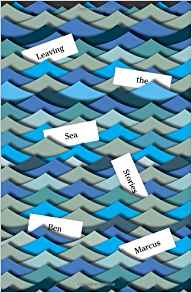What We're Reading: Leaving the Sea: Stories
 Title: Leaving the Sea: Stories
Author: Ben Marcus
Genre: short stories / experimental fiction
Read Great Things Challenge 2018 category: a book you chose for the cover; a book with a supernatural creature, occurrence, or event (maybe)
Why did you choose to read this book?
I was drawn in by the cover art at first. The reviews on the back of the dust jacket also made the stories sound interesting to me. One of my favorite authors, Michael Chabon, has a blurb on the back of the book praising Marcus’s The Flame Alphabet (which I haven't read).
This “themed” collection is of short stories that feature young-to-middle-aged men in crisis. Otherwise, the stories are not related. A divorcé struggles to keep his job and resolve joint custody issues with his ex-wife; a struggling professor teaches a creative writing class aboard a cruise ship; a young man with a mysterious illness seeks treatment in Germany and examines his relationships with his girlfriend, father and a stranger he meets in a hostel; a man worries about his family during a routine evacuation drill in his community; et cetera.
Many of the stories take place in alternate realities: a world in which one can choose to be a baby for one’s whole life, for example.
What did you like about it?
I did not like reading this book. I was motivated to finish it solely to write a thoughtful review.
I found a lot of the book to be interesting, but in many of the stories I felt like Marcus was playing with language for the sole purpose of doing so. Ranging into pure experimental fiction, this book was often either beyond my understanding or it felt like I was being manipulated into feeling stupid for not understanding what is going on, only because the author omitted details I felt would have improved my access to the book.
Did it remind you of any other book, or a movie?
Another collection of experimental fiction is David Foster Wallace’s Oblivion. The freedom with which Marcus uses language and imagery reminds me a little bit of e.e. cummings’s poetry as well.
What feeling did the book leave you with?
In spite of my frustrations with the most experimental stories, this book is memorable and left me wishing I could write fiction with such imagination and confidence in bending language to my will.
Who would you recommend the book to?
Fans and writers of experimental fiction will appreciate this book. Someone who needs a creative spark and doesn’t mind reading some dystopian fiction might find use in this book.
What would you pair this book with?
Even though I don’t keep one myself, a reading or writing journal would be a valuable companion.
Title: Leaving the Sea: Stories
Author: Ben Marcus
Genre: short stories / experimental fiction
Read Great Things Challenge 2018 category: a book you chose for the cover; a book with a supernatural creature, occurrence, or event (maybe)
Why did you choose to read this book?
I was drawn in by the cover art at first. The reviews on the back of the dust jacket also made the stories sound interesting to me. One of my favorite authors, Michael Chabon, has a blurb on the back of the book praising Marcus’s The Flame Alphabet (which I haven't read).
This “themed” collection is of short stories that feature young-to-middle-aged men in crisis. Otherwise, the stories are not related. A divorcé struggles to keep his job and resolve joint custody issues with his ex-wife; a struggling professor teaches a creative writing class aboard a cruise ship; a young man with a mysterious illness seeks treatment in Germany and examines his relationships with his girlfriend, father and a stranger he meets in a hostel; a man worries about his family during a routine evacuation drill in his community; et cetera.
Many of the stories take place in alternate realities: a world in which one can choose to be a baby for one’s whole life, for example.
What did you like about it?
I did not like reading this book. I was motivated to finish it solely to write a thoughtful review.
I found a lot of the book to be interesting, but in many of the stories I felt like Marcus was playing with language for the sole purpose of doing so. Ranging into pure experimental fiction, this book was often either beyond my understanding or it felt like I was being manipulated into feeling stupid for not understanding what is going on, only because the author omitted details I felt would have improved my access to the book.
Did it remind you of any other book, or a movie?
Another collection of experimental fiction is David Foster Wallace’s Oblivion. The freedom with which Marcus uses language and imagery reminds me a little bit of e.e. cummings’s poetry as well.
What feeling did the book leave you with?
In spite of my frustrations with the most experimental stories, this book is memorable and left me wishing I could write fiction with such imagination and confidence in bending language to my will.
Who would you recommend the book to?
Fans and writers of experimental fiction will appreciate this book. Someone who needs a creative spark and doesn’t mind reading some dystopian fiction might find use in this book.
What would you pair this book with?
Even though I don’t keep one myself, a reading or writing journal would be a valuable companion. Category

